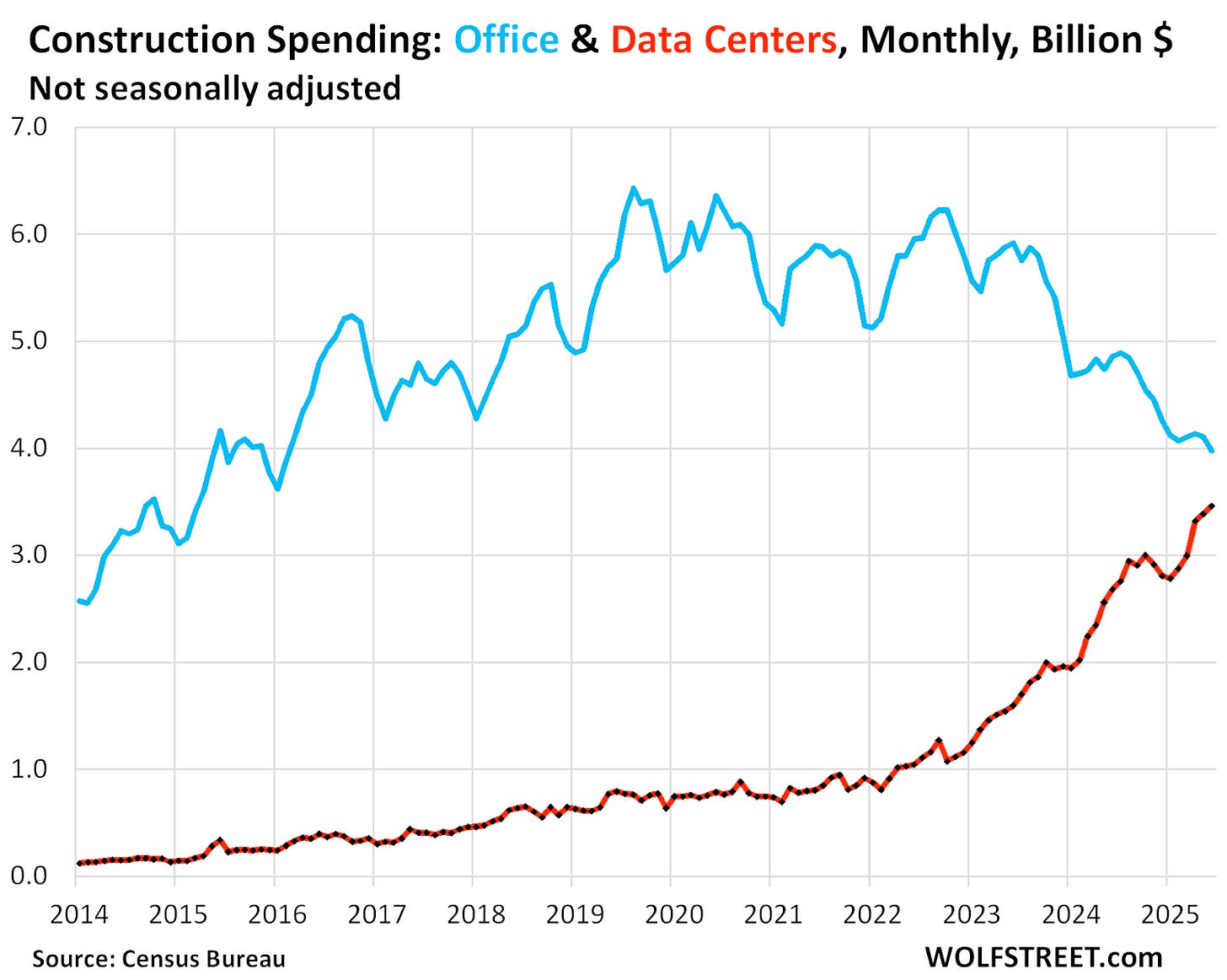🌀🗞 The FLUX Review, Ep. 201
August 7th, 2025

Episode 201 — August 7th, 2025 — Available at read.fluxcollective.org/p/201
Contributors to this issue: Erika Rice Scherpelz, Neel Mehta, MK
Additional insights from: Ade Oshineye, Alex Komoroske, Ben Mathes, Boris Smus, Chris Butler, Dart Lindsley, Dimitri Glazkov, Jasen Robillard, Jon Lebensold, Julka Almquist, Justin Quimby, Kamran Hakiman, Lisie Lillianfeld, Melanie Kahl, Robinson Eaton, Samuel Arbesman, Scott Schaffter, Spencer Pitman, Wesley Beary
We’re a ragtag band of systems thinkers who have been dedicating our early mornings to finding new lenses to help you make sense of the complex world we live in. This newsletter is a collection of patterns we’ve noticed in recent weeks.
“We become what we behold. We shape our tools, and thereafter our tools shape us.”
— Marshall McLuhan
🗺️🪞 From shared maps to personal mirrors
When we learn from a textbook or a predetermined curriculum, knowledge works like an allocentric map. This is what most of us consider “book learning” to be: knowledge landmarks laid out relative to each other, providing a fixed (although not necessarily objective) “top-down” view. In this view, the world is stable, and you figure out how to navigate through it.
Now, with LLMs, we’re shifting to a view of knowledge that is more egocentric. It’s like turn-by-turn GPS directions: our perspective is fixed, and the world reorients as we move. In the same way, LLMs adapt to our framing and interests. This unlocks enormous potential. Instruction that once required personal access to a tutor or expert is now available on demand. Learning becomes more dialog-driven, more improvisational, more responsive. LLMs can bring the more interactive, experiential learning of tacit knowledge to explicit knowledge.
But with this shift comes a slow drift away from a shared map. When each of us learns from our personal perspective, our mental models start to diverge. It’s not that others are wrong, but that our scaffolding no longer lines up. Over time, this can make it harder to compare notes, build consensus, or notice that we're operating from different assumptions.
The comfort of perceived alignment amplifies that divergence. LLMs tend not to push back on our framing, which can lead us to believe our framing is more universal than it is. Without productive friction, we are more likely to stay within familiar frames.
We also lose the ambient structure that can surface unexpected connections. We can learn about anything… but serendipitous encounters become harder to come by unless we intentionally seek them out.
None of this undoes the value of personalization. In many ways, this new learning model is more flexible and empowering. But it shifts the burden: from navigating an allocentric fixed landscape to cultivating the ability to compare, translate, and share across increasingly egocentric terrains.
Thank you to Daniel Barcay (Executive Director of the Center for Humane Technology) for inspiring this essay.
🛣️🚩 Signposts
Clues that point to where our changing world might lead us.
🚏🏗️ The US is spending almost as much on data center construction as office construction
Data center construction in the US has exploded since the start of the AI boom in 2022, and at the same time, commercial construction has slumped. New data from the US Census Bureau finds that spending on building data centers (which has tripled since 2022) is now almost equal to spending on offices. Perhaps relatedly, spending on power plants and energy distribution facilities is up 33% since 2022.
🚏🇪🇺 AWS is launching an EU “sovereign cloud” staffed only by EU citizens
As European companies have grown nervous about their reliance on US tech vendors, the major American cloud platforms have started launching “sovereign clouds,” which only store data in European data centers and make strong guarantees about privacy. Amazon’s new European Sovereign Cloud takes things a step further: its data centers will only hire EU citizens physically located in the European Union to “ensure that all operators have enduring ties to the EU.”
🚏👗 Vogue put an AI supermodel on its cover
August’s print edition of Vogue will feature an AI-generated ad for Guess on its cover, marking “the first time that an AI-generated person has featured in the magazine.” The cover features a blonde woman in a maxi dress, and another Guess ad features an AI-generated brunette by the sea. When pressed on why they only created young, white, and conventionally attractive AI models, the ad’s creators said, “We've posted AI images of women with different skin tones, but people do not respond to them - we don't get any traction or likes.”
🚏🎰 Las Vegas’s visitor count is down 11% in the last year
The number of tourists visiting Las Vegas this June was 11.3% lower than last June. One commonly cited reason is that big-spending international travelers are staying away due to increased visa fees and geopolitical tensions; for instance, Air Canada carried one-third fewer passengers to Vegas than last year. Rising costs, deteriorating gambling experiences (with many casinos now offering worse odds and replacing table games with slot machines), and the rise of betting apps have kept domestic travelers away too. The only bright spot is convention traffic, which is up 10%, but it can’t fully compensate for the decline in leisure travel. (The kicker is that, despite all this loss in traffic, Sin City’s gambling revenue is still up 3.5% year-over-year.)
📖⏳ Worth your time
Some especially insightful pieces we’ve read, watched, and listened to recently.
Can We Fix Social Media? Testing Prosocial Interventions using Generative Social Simulation (Maik Larooij & Petter Törnberg / Bluesky) — Describes a study in the emerging field of “generative social simulation,” which uses AI “for theory development in the social sciences.” The authors created a minimal social network populated solely by AIs and tried a variety of interventions to combat the common problems of echo chambers and the amplification of extreme voices. No intervention worked, suggesting that the very structure of social networks (e.g., following networks and repost-driven virality) leads to toxic information environments.
A Study of Lights At Night Suggests Dictators Lie About Economic Growth (The Economist) [Archived] — Recaps a famous study that used the brightness of cities’ lights at night (found in satellite photos) to estimate a country’s actual GDP growth, and compared that to the growth reported by the government. Democratic countries reported GDP growth pretty accurately, while autocratic states’ proclaimed GDP growth was almost double their actual growth. Dictators usually want to overstate GDP figures to make themselves look better, and their subordinates who compile the numbers face similar incentives.
Indigenous Fire and Why Burning is Good (Ancient Americas / YouTube) — Details how the indigenous peoples of the Americas used controlled burning for farming, foraging, hunting, war, and cultural purposes, thus putting the lie to the notion that the Americas were an untouched wilderness before Europeans showed up. In fact, for centuries, Americans’ attempts at fire suppression caused all kinds of ecological problems, including making wildfires worse.
Mario Is (NP-) Hard (Newbie Indie Game Dev / YouTube) — A quick and accessible explanation of the key computer science concepts of computational complexity, NP-completeness, and reduction, plus the famous question of P=NP, through the example of Super Mario Bros. You can reduce the 3SAT problem (a famous NP-complete problem) into a custom Mario level, which means that deciding if a Mario level is completable is NP-hard.
🔍📆 Lens of the week
Introducing new ways to see the world and new tools to add to your mental arsenal.
This week’s lens: emotive conjugation (aka Russell’s conjugation).
“I am firm, you are obstinate, he is a pig-headed fool.” This line from Bertrand Russell captures how language can shape perception. The underlying meaning remains constant—someone holds their ground—but the emotional tone varies dramatically. This is the essence of emotive conjugation.
Emotive conjugation works by embedding value judgments into otherwise factual statements. One person is “passionate;” another is “unhinged.” A strategy is a “bold move” in one context, a “reckless gamble” in another (often determined after the fact). These shifts often go unnoticed, but they impact how ideas are received. Because they often operate below the threshold of conscious scrutiny, their effects can be subtle: shaping feedback loops, reinforcing hierarchies, or rerouting focus.
They also encode power. Who gets to describe themselves as “principled” rather than “rigid”? Who gets labeled a “whistleblower” instead of a “leaker”? Control the conjugation and you control the storyline.
What do we do with this? First, develop a habit of noticing. Is the emotional tone of a word shaping how you react to a claim? Would your interpretation shift if the description changed? Try it and see. Second, use language with intention. If you're trying to shift how something lands, sometimes the smallest, most effective lever isn’t the substance. It’s the frame.
Emotive conjugation is a reminder that small lexical choices can recalibrate meaning. And if this feels a bit manipulative, remember that no language is neutral. It is better to be intentional than accidental.
© 2025 The FLUX Collective. All rights reserved. Questions? Contact flux-collective@googlegroups.com.



Love the “shared map → personal GPS” metaphor. It captures the upside of LLM-driven learning, but also the fragmentation risk. Makes me wonder; if we’re all navigating custom landscapes now, what’s the new “shared compass” that keeps us able to compare notes?